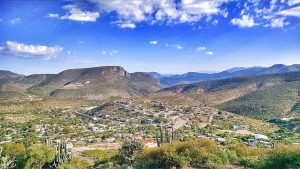This project is made possible through the partnership of Water Charity and the National Peace Corps Association. ![]()
Location
El Portugués, Peñamiller, Querétaro, México
Community Description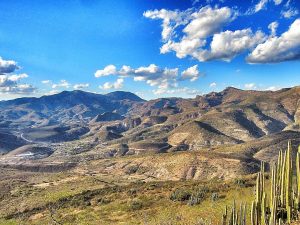
El Portugués is perched in the mountainous, semi-desert region of the Sierra Gorda of Querétaro. The hills are matted with low, thorny matorral, diverse species of cactus, and a rainbow array of mineral-based rock formations. Despite the natural beauty, the town suffers from limited access to water due to very low rainfall, and a non-traditional location far from natural springs thanks to a government decision 40 years ago to move the town.
Families receive water from a groundwater well pump for only a couple of hours every third day, and so must store water in plastic drums or small tanks, plus reserves if/when the power goes out to the pump. Unlike other towns in the region, home gardens are scarce because of the lack of spring water, meaning that nearly all fruit and vegetables must be imported from hours away.
It is a small, yet strategically located town for the locality because it sits at a T-junction, at the end of the paved stretch of road leading from the highway. Thus it is a meeting point for 18, mostly smaller, communities. It is a relatively poor, isolated region with few local jobs, and almost all income coming from family members working in the city of Querétaro or in the United States.
Problem Addressed
Rainfall rarely exceeds 50 cm a year in the region, and with the intense heat, almost no natural surface water accumulates. Therefore, groundwater extraction is used for all potable purposes. Houses get water pumped from a distant well for one hour every three days. Families use a combination of 1,000 L Rotoplas tanks (usually government donated), 55-gallon plastic containers, and/or concrete piletas, which are open-air, concrete tubs, to store this precious water. A few homes do try to capture rainfall in small plastic buckets, but since rainfall events tend to be infrequent and strong, they quickly fill up and the water doesn’t last. All families attempt to grow home gardens but are severely restricted by access to water and many give up.
According to household surveys, families prioritize the need for water security precisely so that they can return to growing some of their own produce in vegetable gardens. Even traditional farming of corn and beans, which is located on terraces surrounding what are now completely dry stream-beds, is increasingly less productive. Thus there is a great need for improved storage options in the community, and to make use of the captured rainfall over the dry months.
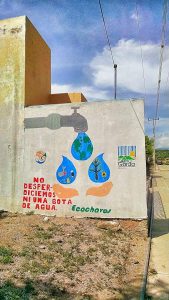 Project Description
Project Description
This project is to build 10,000-liter cisterns for 8 homes and one for the secondary school by the end of May 2016, while training community members on construction techniques, building home gardens, water-saving practices, and the impacts that climate change is having on the local hydraulic cycles.
Knowledge of climate change risks that face El Portugués will be expanded, especially with regard to desertification and increasing rainfall anomalies.
The community has experience with similar construction projects, and they have shown that they have the willingness, abilities, and attitudes that will bring this project to fruition. Families that receive cisterns will rehabilitate their home gardens, using new techniques and new access to stored water. The objective of this project is to improve the quality of life for the community members by improving their access to a water-secure future through rainwater harvesting, a viable, sustainable solution that will protect their hydrological resources and enable the growth of fresh, healthy, traditional produce.
Capacity building for the benefiting parties and other community members who have expressed interest in learning about the rainwater harvesting will begin. Furthermore, classes will be implemented for secondary school students to investigate RWH and how it fits into their academic curriculum. Next is the construction of the cisterns.
Families will prepare for construction by installing their own gutter systems, obtaining sand and gravel, and assisting with material transport. The construction itself will occur in groups, where each group of masons will be responsible for three cisterns to promote quick, responsible building. Finally, once the cisterns are completed, families will prepare their vegetable gardens for the upcoming rains and in the fall will be ready to harvest their home-grown produce.
Community Organization
Comité del Agua de la Lluvia is the main organizer, which has assisted with planning, logistics, and implementation strategies.
Project Impact
This project will benefit 154 people.
Peace Corps Volunteer Directing Project
Michael Escobar
Monitoring and Maintenance 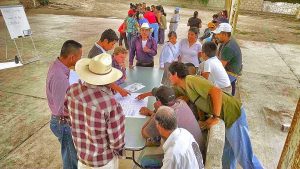
Monitoring of the project process will be overseen by the Peace Corps Volunteer, while maintenance procedures will be led by the Rainwater Committee. Together an Operations & Maintenance Manual will be assembled for all cistern owners to follow. Through capacity building and direct involvement in the project process, the community will take ownership of their work, and will have the ability to maintain the optimal function of the cisterns.
It is essential to have local skilled experts, such as the municipal engineer and local training staff as a resource should any issues arise. A couple of homes in town already have similar cisterns, so buy-in for the technology already exists. However, building one in the secondary schools will make for the perfect public model that others can view and learn from.
Although cistern construction is the most exciting part of the project process, the development of various capacities and knowledge bases is, in fact, the most important aspect of the project process. Technical training focuses on the construction process for cisterns so that there are trained adults in the community that can replicate this process, perform repairs, and successfully maintains the cisterns in the future without the need for external consultation.
Furthermore, training on gardening practices will mix technical and educational, so that a wide base of community members can effectively maintain flourishing fruits and vegetables, through efficient water practices. Climate change education is also essential to prepare for more challenging water resource availability in the future. By incorporating students in the learning process, it will promote intergenerational continuation.
Comments
This project was determined to be a top priority through direct community interactions, including various Participatory Analysis for Community Action (PACA) workshops, household surveys, and a final pair-wise ranking of projects. Rainwater harvesting was voted on as the most important environmental need and had universal support. The demand for cisterns is far greater than can be met through a single grant, so this is going to be part of a larger series of planning to support the community’s interest. El Portugués has an organized community structure and is more than prepared to contribute their necessary share, as well as learn more about water conservation and best use practices for home gardening.
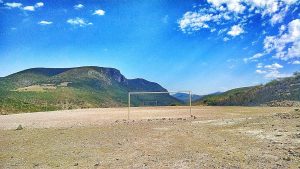 Climate change plays a huge role in this project, and it will be interesting to see the long-term effects on water security as a result of these cisterns. Right now, desertification and erratic rainfall patterns have taken a toll on the agricultural and economic prospects of the region, causing forced migration of laborers to nearby cities and the United States. Some farming plots have been abandoned, and domesticated farm animals have been sold because it isn’t feasible to maintain them in the current water situation. It won’t be possible to quantify the exact impact the cisterns have on such a complex, systemic problem, but these cisterns will be part of an adaptation strategy to rehabilitate and revitalize the region.
Climate change plays a huge role in this project, and it will be interesting to see the long-term effects on water security as a result of these cisterns. Right now, desertification and erratic rainfall patterns have taken a toll on the agricultural and economic prospects of the region, causing forced migration of laborers to nearby cities and the United States. Some farming plots have been abandoned, and domesticated farm animals have been sold because it isn’t feasible to maintain them in the current water situation. It won’t be possible to quantify the exact impact the cisterns have on such a complex, systemic problem, but these cisterns will be part of an adaptation strategy to rehabilitate and revitalize the region.
Although this is not officially a Let Girls Learn Project, it will benefit girls by helping them to stay in school by providing clean, private facilities for them to take care of their personal needs. This will also increase health so that the girls are able to stay in school and get a proper education.
Dollar Amount of Project
$4,500
Donations Collected to Date
$4,500
Dollar Amount Needed
$0 – This project has been funded through the generosity of the Paul Bechtner Foundation.
Additional donations will go toward funding other projects in Mexico.
![]() This project has been completed. To read about the conclusion of the project, CLICK HERE.
This project has been completed. To read about the conclusion of the project, CLICK HERE.
